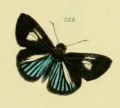| Pythonides lancea | |
|---|---|
 | |
| Pythonides lancea observed in Brazil in 2018 | |
| Scientific classification | |
| Domain: | Eukaryota |
| Kingdom: | Animalia |
| Phylum: | Arthropoda |
| Class: | Insecta |
| Order: | Lepidoptera |
| Family: | Hesperiidae |
| Genus: | Pythonides |
| Species: | P. lancea |
| Binomial name | |
| Pythonides lancea (Hewitson, 1868) | |
| Synonyms | |
| |
Pythonides lancea is a species of butterfly in the skipper family, found in Brazil and in Argentina. [1] [2]
Pythonides lancea was first described in 1868 by William Chapman Hewitson and named Leucochitonea lancea, after realizing this species was different from P. jovianus previously described by Pieter Cramer. [3]



